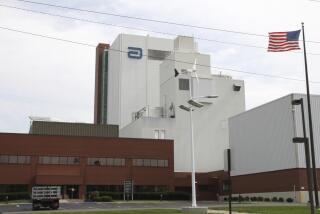Silicon-Gel Implant Records Altered : Pharmaceuticals: Ex-U.S. Atty. Gen. Griffin Bell recommends Dow Corning notify the FDA. The firm says no evidence of health risks were found.
- Share via
DETROIT — Some records on the manufacture of silicone-gel breast implants at Dow Corning Corp. in the 1980s were altered by employees, a review of the pharmaceutical company’s operations revealed Monday.
Dow Corning officials found no evidence of any health risks because of the changes, which involved substituting charts that failed to properly record the temperature of ovens used to bake the silicone.
But former U.S. Atty. Gen. Griffin Bell--hired by Dow Corning in January to examine its silicone-gel operations--recommended that the company inform the Food and Drug Administration about the violation of company policy.
Dow still doesn’t know which records were altered so it can’t say which batches of implants or how many batches were affected, Bell said.
Dow Corning released Bell’s findings Monday.
An FDA spokesman, Gary Fendler, refused to comment on the report because of the agency’s ongoing investigation into the controversial implants.
The agency ordered a moratorium on silicone breast implants Jan. 6, and Dow Corning--equally owned by Dow Chemical Co. of Midland, Mich., and Corning Inc. of Corning, N.Y.--withdrew its implants from the U.S. market.
Dozens of lawsuits are pending by women who claim problems with the implants.
The company said it found out about the replacement charts in November, 1987, halted the practice and disciplined several employees.
The charts were replaced to avoid “what some employees perceived as a bureaucratic mandatory review of records that were incomplete or imperfect,” the company said.
The original temperature readings may have been invalidated by such factors as interruptions in power to the baking ovens, or when the recording device ran out of ink, the company said.
In a statement, Keith McKennon, chairman and chief executive of Dow Corning, said the changes did not cause any health dangers.
“Each finished product was always individually inspected,” McKennon said.
Dr. Sidney Wolfe, director of Public Citizen’s Health Research Group and a leader in getting the implants off the market, called Dow Corning’s failure to report the alterations “criminal.”
In making silicone gel, the liquid silicone is heated until it becomes gelatinous, Wolfe said.
“Depending on what the temperature is, you’re going to create different kinds of chemicals,” he said. “There may be more toxic substances in the gel when it’s finished, and it would seem criminal to me to play around with the cooking process.”
Leaks from the gel-filled implants have been linked to breakdowns in the body’s immune system and cancers.
About 1 million American women have had the implants, about 80% of them for breast enlargement and 20% for reconstructive surgery after a mastectomy for breast cancer.
On March 19, the company said it would not re-enter the silicone-gel implant market and established a $10-million research fund to continue study of the devices.
Among Bell’s other recommendations were for Dow Corning to hire an independent expert to review its production and record-keeping practices and to continue providing financial aid to women who can’t afford to have implants removed.
Dow Corning spokesman Ronald Actis said the company planned to implement the recommendations within 30 days.
More to Read
Inside the business of entertainment
The Wide Shot brings you news, analysis and insights on everything from streaming wars to production — and what it all means for the future.
You may occasionally receive promotional content from the Los Angeles Times.










